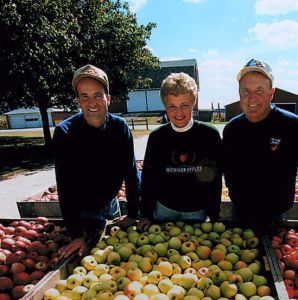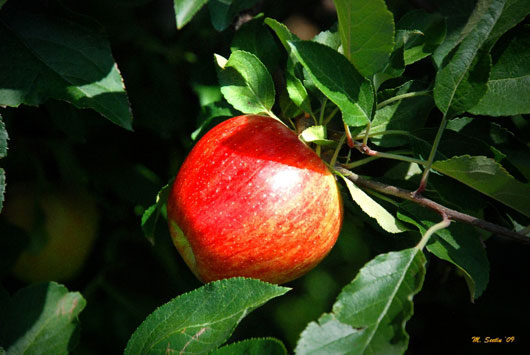 Совет по экспорту яблок США – US Apple Export Council – членами которого являются производители штата Мичиган – помогает фермерам выйти на экспортные рынки путем сотрудничества с другими штатами и используя поддержку федеральных фондов.
Совет по экспорту яблок США – US Apple Export Council – членами которого являются производители штата Мичиган – помогает фермерам выйти на экспортные рынки путем сотрудничества с другими штатами и используя поддержку федеральных фондов.
Яблоки являются самой важной плодовой культурой, выращиваемой в штате Мичиган. В 2005 году Мичиган поставил на рынок приблизительно 635 тыс. тонн фруктов, включая яблоки, вишню, черешню, голубику, персики, виноград, клубнику, груши и сливы. 56 процентов данного объема составляют яблоки, с общим результатом – 354 тыс. тонн. Яблоки, по-прежнему, являются самой важной и наиболее ценной плодовой культурой штата Мичиган, которая приносит около 100 миллионов долларов производителям яблок каждый год.
В коммерческом производстве задействовано более 7,5 миллионов деревьев, занимающие площадь 37 000 гектар по всему Нижнему Полуострову штата Мичиган. Небольшие семейные фермы, владельцы которых работают в своих собственных садах, доминируют в яблочной индустрии штата Мичиган. При создании новых садов используется современный тренд плотной посадки, до 500 деревьев на каждый акр. Хорошо подготовленные, посаженные близко друг к другу саженцы, намного быстрее начинают плодоносить по сравнению со «стандартными» яблочными деревьями, и поэтому производители могут представлять новые сорта на рынке намного быстрее.
Штат Мичиган также играет важную роль в переработке яблок. Более 60 процентов всех яблок Мичигана перерабатываются. Мичиган является самым крупным поставщиков яблок в нарезке, которые используются в производстве яблочных пирогов, соуса, свежего яблочного сидра.
Мексика и Латинская Америка всегда были важными направлениями сбыта яблок, выращенных в Мичигане. Однако в последнее время стали появляться новые рынки – Россия и Индия. Обычно штат экспортирует от 4 до 6% урожая. Чтобы оставаться конкурентоспособным, фермеры придерживаются южных направлений сбыта: 13 из 14 стран-импортеров расположены южнее Мичигана.
Это происходит потому, что штату приходится конкурировать с Нью-Йорком и Вашингтоном, расположенными соответственно на восточном и западном побережье. «Однако, – говорит Дениз Донахью, исполнительный директор Комитета по яблокам Мичигана, – нашим фермерам удалось выйти на рынки России, Индии и некоторых стран Азии.
Самым распространенным сортом в штате Мичиган все также остается Ред Делишес, за которым идет Голден Делишес. Однако сорт Гала уже входит в список «традиционных» сортов. Сорт Ханикрисп постепенно набирает популярность, привлекая потребителя своим сладким вкусом и сочностью.

